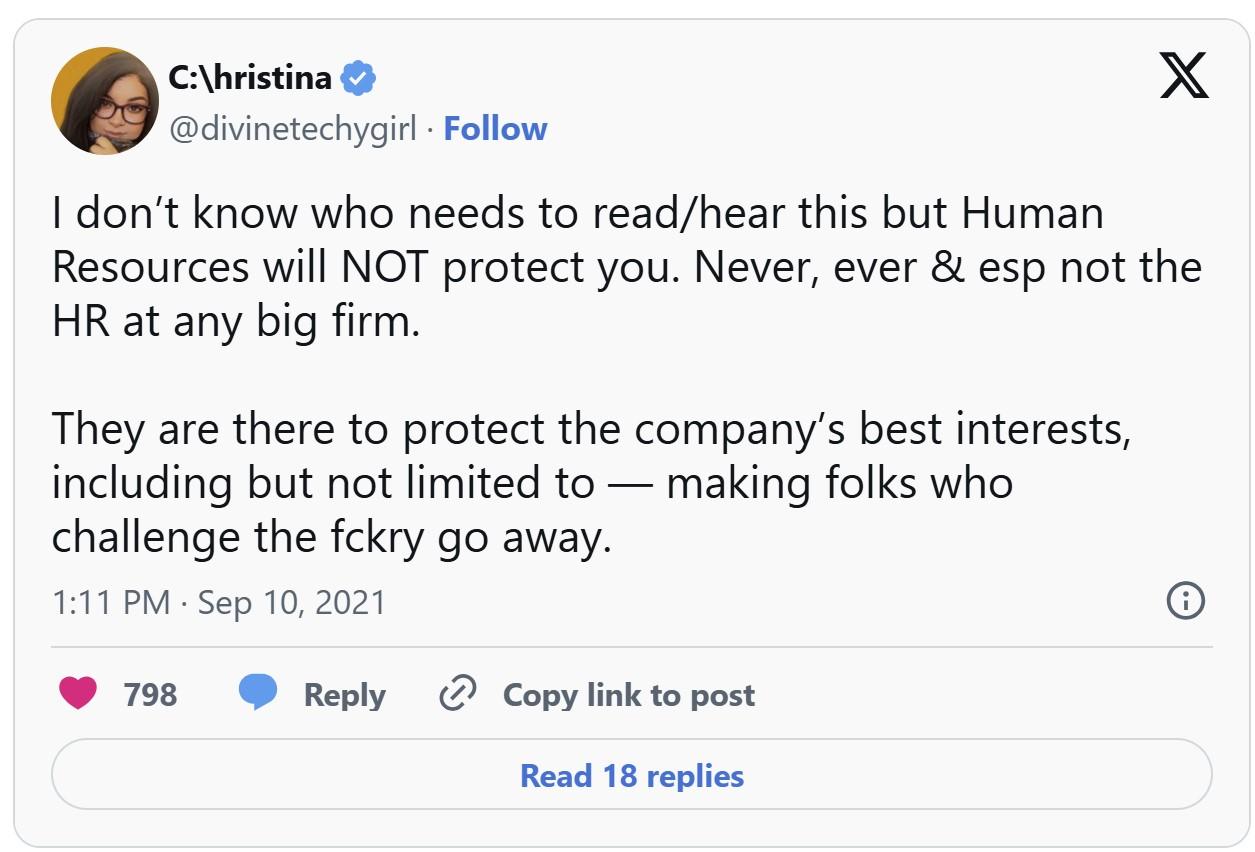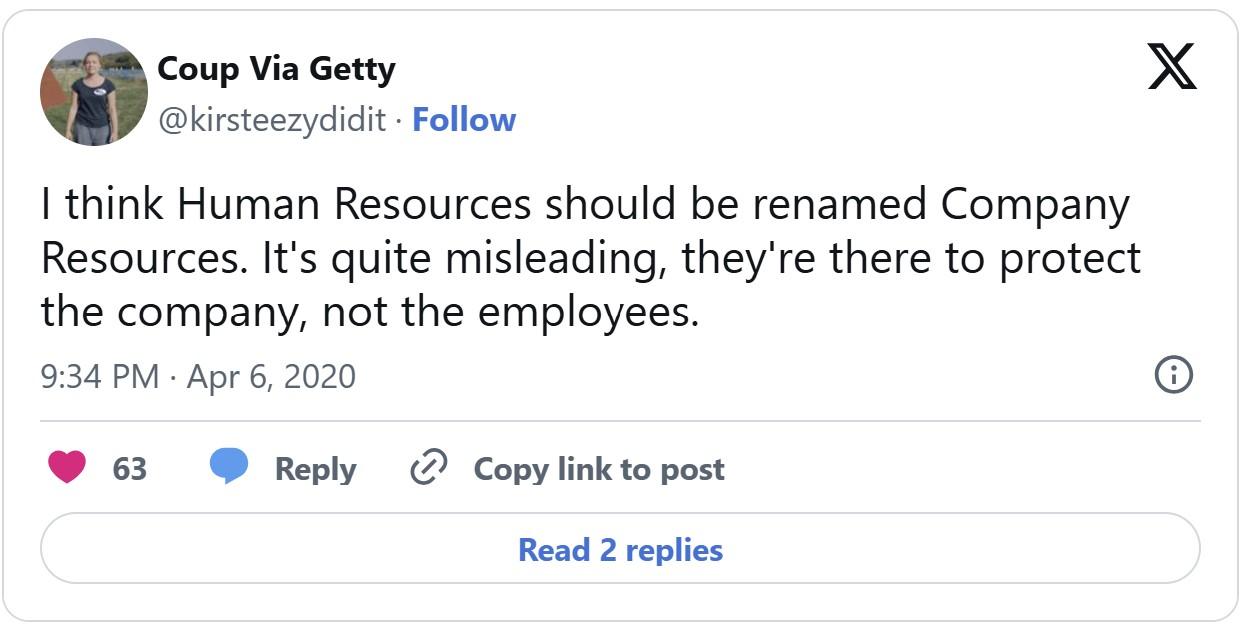There appears to be a growing number of posts on social media at the moment, relating to the HR profession. TikTok especially seems saturated with content branding HR departments as ‘evil’, ‘backstabbing’, and ‘only there to protect the company, not the employee.’
This isn’t a new way of thinking, however. Anyone who has worked in any job in any industry will likely have heard mutterings of discontent about the HR department. A meeting with HR is something to dread and avoid. The HR function is viewed almost like a Police force – there to enforce rules and behaviours, and to try and catch you out.
I don’t know who needs to read/hear this but Human Resources will NOT protect you. Never, ever & especially not the HR at any big firm.
They are there to protect the company’s best interests, including but not limited to — making folks who challenge the fckry go away.
HR professionals themselves are more than aware of the image problem that their profession has. Some are using their social media platforms to call out bad practice within the industry, such as Veronica, aka PeopleCultureCollective, a senior HR Professional based in Australia. She creates content that highlights HR policies that don’t centre the employee, and cause trust to break down between company and employee, and even gives ideas as to how companies can adjust their policies to bridge the gap between HR functions and employees.
‘You can’t trust HR’ - Where did HR’s image problem come from?
This isn’t a new problem. Unfortunately, this picture of HR as a company’s ‘enforcers’ has been several decades in the making, not helped by managers using the threat of getting HR involved as a punishment, and very little has been done to try and mitigate this view. It is much too easy for Managers to make HR ‘the bad guy’.
The vast majority of the HR professionals that we know are kind, caring, and genuinely care for the workforce that they represent, as well as being incredibly business-savvy with invaluable commercial knowledge. There is a whole spectrum of opinion when it comes to HR, with some people understanding their value and importance and trusting them, but others are convinced that HR isn’t to be trusted and avoiding confiding in them at all costs.
Anecdotally, many say that this image has come about as we have ‘Americanised’ business here in the UK. The rise of multi-national corporations and globalisation has caused the ‘US way’ of doing things to seep into our HR teams and systems here in the UK. And we all know that the majority of the business world in the US doesn’t centre their people, instead treating them as disposable. This isn’t helped by popular media – when was the last time you saw an understanding, non-threatening HR representation in film, TV, or books?
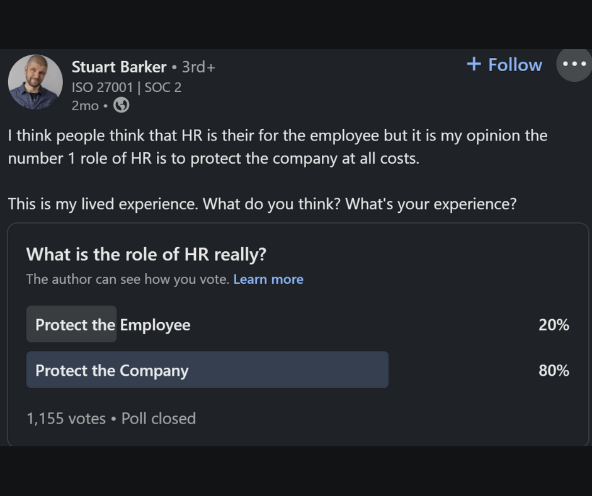
It has leapt to the forefront over the past 12 months, however, due to a combination of technology, the pandemic, and workers re-evaluating what they want out of their jobs and workplaces.
Millennials have been quietly griping about these matters for some years now, but now that Gen Z has entered the workplace, they have been much more open, and many openly talk about their work gripes online. Starting these conversations has caused others to open up, and unfortunately the HR profession has not come out of many of these conversations in a favourable light.
Is it time to put the ‘human’ back into Human Resources? - How can HR teams tackle the issue and win back trust?
“It is practically a business truism that the HR function is not well respected at many organizations.” - KPMG, Rethinking Human Resources in a Changing World
Much of the mistrust in HR is, in our opinion, misplaced.
Often, HR teams will just implement whatever policy or action that a manager dictates. However, because the communication comes from HR, and the HR function will doesn’t always push back on the manager’s decision, they are often seen as the bad guy.
HR teams can help mitigate this by becoming true influencers to the C-Suite Executives and Team Managers at their organisations.
Many Executives assume that HR is more of an administrative department, there to push around paperwork and make sure that legal process is being followed when it comes to hiring and firing. Few C-Suite Executives consider the true depth of knowledge and experience a HR team can bring to the organisation.
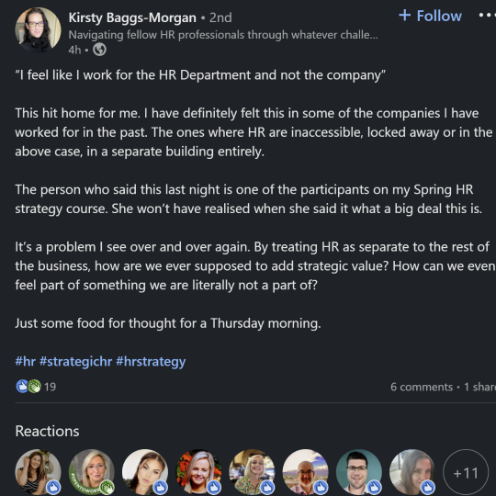
If HR professionals can influence the leaders of the company, and if these leaders will truly listen to their HR teams, they have the power to bring about real, lasting change within an organisation.
HR Teams could also consider more positive interactions with the general workforce. When HR teams are locked away in their offices, only to be seen when something goes wrong and needs fixing, that can support the notion that they are only there for negative reasons. Integrating the HR team into the 'general population' and day-to-day activities can help de-stigmatise HR.
We asked our HR recruitment experts what they think…
What can businesses and HR teams do to improve their negative image?
“Communication Communication Communication! True HR/People functions enable the business by helping to keep culture at the forefront – they coach and enable line managers to manage their own teams, and have courageous conversations. They should be a critical friend to the board - especially around people & culture. They should add true value to the bottom line – and understand the P&L and demonstrate ROI.” – Vanessa Jackson, HR Division Director
“HR Teams need to become a blend of being human and business focused, and realise that they aren’t exclusive of each other. A sustainable business is likely to have people at its heart.” – Lindsey Wroe, Associate Director, HR Division
“Businesses need to stop viewing employees simply as resources - many forget the human element and all the emotions and challenges that come with dealing with people. We’ve seen many businesses shift towards a new way of looking at HR, often referred to now as People Team, and putting much more focus on culture, employee engagement and wellbeing. However we are still not seeing the level of roles you would expect across these specialities post-pandemic, especially with the accelerated mental health challenges and employee burnout.” – Kayleigh Yarwood, Senior Consultant, HR Division
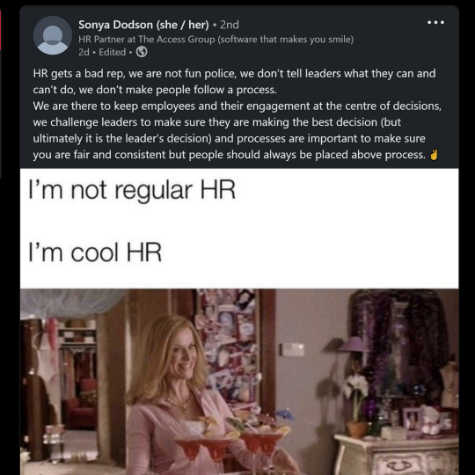
Have you noticed any difference in HR teams since the pandemic?
“The pandemic has been a real eye opener for businesses and HR functions have worked tirelessly to implement change, such as agile working & engagement – creating that new normal. Businesses have sat up, taken note and focused on strengthening support in their HR offering.” – Vanessa
“We're seeing change around the phrase ‘Human Resources’ – a focus on the 'resources' part and not so much the ‘human’ in the past is likely to have been detrimental. We’re seeing a continued shift towards ‘People’ or ‘People and Culture’ functions, as opposed to 'Human Resources'.” – Lindsey
“HR have had an immensely difficult challenge, navigating its way through the pandemic with the ever-changing and undistinguishable guidelines. HR professionals have done a great job enabling fully remote workforces and the difficulties that come with this new approach, highlighting how adaptable and fundamental their expertise and support is to both employees and the wider business. We’ve found those businesses that didn’t have (or value) HR support throughout the pandemic have really struggled - it’s had detrimental impact on their business culture and employee attrition.” - Kayleigh
Do you think that as future generations, eg. Gen Z, join the HR workforce things will change?
“I think change is coming in already – post-pandemic, HR is getting some of the kudos it deserves and people of all generations are looking to work within cultures with strong communication and engagement, where the culture is positive and life/work is balanced.” - Vanessa
"Old fashioned views have stuck around for a long time, but with the multi-generational (and more diverse) workforce we now have, it’s really shifting. I think this will continue to shift, with lots of change incoming as Gen Z join the workforce, as they are very purpose and wellbeing driven. HR can be massive enablers for both of these things.” – Lindsey
“There has been much progression and change within HR, and I believe businesses are now more than ever seeing the real value in investing in its people and giving HR a seat at the top table. It was great to see Tesco Ireland recently appoint their CPO as their new CEO, highlighting the value of HR within business strategy.
Its widely stated Gen Z are more diverse than previous generations, this will have a great impact with different perspectives will come improved innovation, creativity and engagement.Coupled with their education and digital ability, I’m sure Gen Z will bring some exciting changes ahead.” - Kayleigh
Fancy a chat about the HR Function at your business? We’d love to hear from you!
Vanessa Jackson, HR Division Director – vanessa@weareadam.com
Lindsey, HR Principle Consultant – lindsey@weareadam.com
Are you a HR Professional looking for a new role? Then you need to get your CV into Sarah’s inbox!
Sarah, HR Division Resourcer – sarah@weareadam.com
